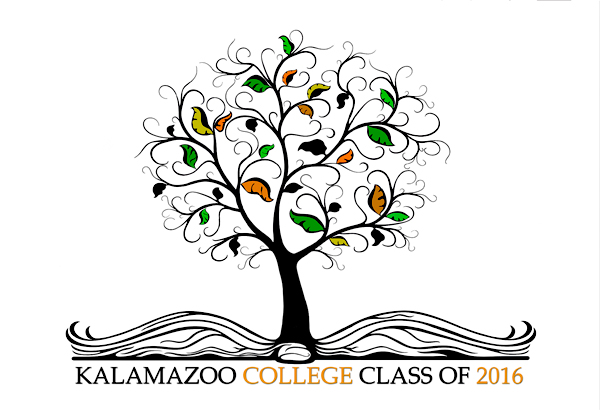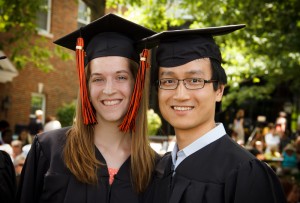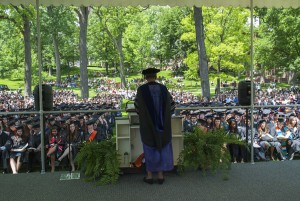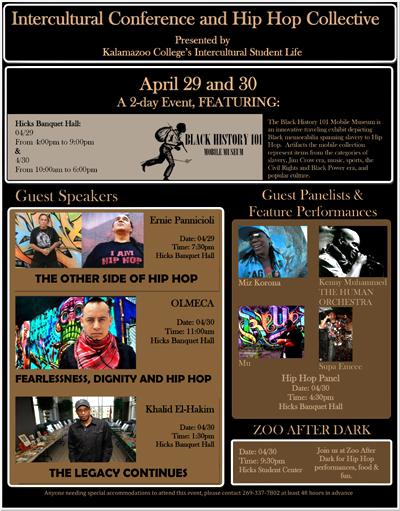Every graduating senior contains a multitude of stories. Commencement celebrates them. And Commencement day adds more. Like this one from proud father Rich Frishman (a Seattle-area based photographer), who cultivated a special gift for his son Gabe Frishman (class of 2016) and Gabe’s friends and academic advisor. The photo is the face plate of a card designed by Rich, and the story behind it we share below in Rich’s own words.
“From our first visit, when Gabe was selecting which college would best challenge him, we have been struck by the beauty of K’s compact quad, rolling idyllically down from Stetson, and all the energy it contained. As the heart of the campus, it seems to symbolize the nurturing environment of Kalamazoo College. The towering white oaks and lush grass transform a simple rectangle bounded by concrete and brick into a welcoming meeting place full of life. The trees became symbols, living embodiments of this special place and process; of growth and strength and transformation.
Watching my son Gabe and his friends joyfully embracing each other on the quad, then hurling themselves with complete abandon into the pillow-like piles of gathered autumn leaves, inspired this botanical experiment. Gabe, my wife Brenda and I began collecting acorns on the lower end of the quad (between Hoben, Hicks and Upton) on October 26, 2012, our inaugural Family Weekend. The acorns were most abundant that year. We eagerly gathered a couple dozen freshly fallen seeds, thinking that it would be sweet to have living tokens of Gabe’s new home at our old home. It was when planting them back on Whidbey Island that I thought they’d be a great gift to give to Gabe’s friends and classmates upon graduation. My sentimental notion was evolving.
Had I been successful that first year, I would have needed a moving truck to bring the seedlings back to Kalamazoo in 2016, but Mother Nature was wise. None of those acorns seemed to germinate. Perhaps they’d been eaten by our own squirrels, or the seeds suffocated in transit, or they needed a harder freeze to activate.
By the time of our second Family Weekend I had spent endless hours studying the horticultural requirements for successful white oak acorn germination. My hypothesis was that the weather in the Maritime Northwest was too temperate for seeds that thrived in Midwest winters. So I tried refrigerating our next harvest of Kzoo quad acorns, storing them just above freezing for two months, then planting them in the early spring.
Mother Nature got a good laugh out of that experiment. Out of another dozen acorns, none seemed to survive. Apparently that theory was not ready for publication.
With Gabe in Budapest for study abroad in 2014, we had no Kzoo acorns to plant.
Our final Family Weekend, around Halloween 2015, yielded a moderate number of healthy acorns, all gathered from the same eastern end of the quad. The squirrels seemed more corpulent and the available seed stock harder to find, but we all searched. When I got these back to Whidbey, I took a minimalist approach, planting each acorn in a one-gallon pot. Thinking perhaps my first year’s failure might have been attributable to predation, I built cages to keep them safe from squirrels, chipmunks, deer and rabbits.
Eureka! Despite our very mild winter, shoots began to break the soil in March. By the time we were finalizing our Kalamazoo Commencement plans, we had nearly a score of foot-tall white oak seedlings. I decided I would drive a dozen of them from Seattle to Kalamazoo so we could give them to Gabe’s friends as living tokens of their four years at K.
Men plan and God laughs, they say. And men plant and chipmunks grin. Nature did get one more giggle before I reached Kalamazoo. When Brenda and I stopped in Chicago, I placed our dozen seedlings in a sunny spot protected from the deer that roamed the neighborhood. Some wily chipmunks smelled a feast and eviscerated half the crop from their pots, so we were left with just six to give as gifts. Gabe carefully distributed those few to his brilliant advisor, Professor John Dugas, and five other friends.
Our garden still has six authentic Kalamazoo Quad white oak seedlings, now in two-gallon pots, awaiting final placement. One I know will grow by our house, a reminder of a time and place we hold dear. One will follow Gabe wherever he lands, a symbol of where he was launched.
The choice of tree was completely dictated by heritage. If Kalamazoo’s quad was dotted with Mountain Ash, I would have planted whatever Mountain Ash seeds I could gather. The seeds had to come from the quad because they serve as a totem of the school and the educational quest. Acorns gathered elsewhere would not suffice.
The graduation card was a last-minute creative exercise. I wanted to offer a context and explanation for why Gabe’s gift was significant. I consider the Kalamazoo experience a gift that empowers its students to grow from humble soil into the light.
Gabe is passionate about learning. His hobbies have long been thinking, reading, and questioning…along with cycling, camping and rockhounding.
When it came to selecting a school, he sought a small liberal arts college where he would be challenged academically and supported emotionally, where he could build relationships with faculty and friends. His interests in international affairs, politics, philosophy and the environment were part of what lead him to select Kalamazoo College.
Gabe’s plans for his future are still evolving. He’s considering taking some time to work in his field of study, political science, possibly through a non-profit or NGO or outreach program like the Peace Corps. Gabe anticipates eventually returning to school to get a Ph.D. or J.D., but first he wants to better understand precisely where he wants to focus his energies.”
The inside of Rich’s graduation card reads: WE CELEBRATE YOUR GRADUATION FROM K, AND THE DEDICATION IT REPRESENTS. THIS WHITE OAK SEEDLING IS FROM AN ACORN FALLEN FROM ONE OF THE MANY BEAUTIFUL TREES THAT LINE KALAMAZOO’S QUAD. IT IS A SYMBOL OF A TIME AND A PLACE FOREVER DEAR TO OUR HEARTS. WE HOPE YOU WILL GROW LIKE THESE TREES, FULL OF STRENGTH AND POWER AND LIFE’S MAJESTY.

















